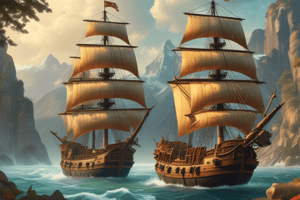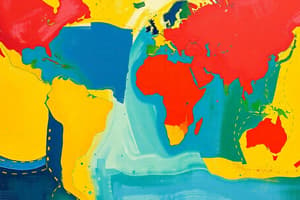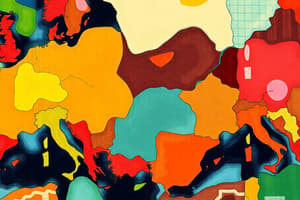Podcast
Questions and Answers
The Age of Exploration was a period of European history primarily between the 14th and 16th centuries.
The Age of Exploration was a period of European history primarily between the 14th and 16th centuries.
False (B)
A key driver of exploration was the European search for new trade routes to the East.
A key driver of exploration was the European search for new trade routes to the East.
True (A)
The Age of Exploration was primarily driven by a desire to expand knowledge and understanding of the world.
The Age of Exploration was primarily driven by a desire to expand knowledge and understanding of the world.
False (B)
The astrolabe, compass, and better maps were crucial for sailing long distances during the Age of Exploration.
The astrolabe, compass, and better maps were crucial for sailing long distances during the Age of Exploration.
The caravel, a new type of ship developed during the Age of Exploration, was less seaworthy than older ships, but it was faster.
The caravel, a new type of ship developed during the Age of Exploration, was less seaworthy than older ships, but it was faster.
European explorers relied on superior weapons technology to outmaneuver and overcome indigenous populations during the Age of Exploration.
European explorers relied on superior weapons technology to outmaneuver and overcome indigenous populations during the Age of Exploration.
The Age of Exploration led to limited cultural exchange and the spread of goods and ideas across the globe.
The Age of Exploration led to limited cultural exchange and the spread of goods and ideas across the globe.
Christopher Columbus was a Portuguese explorer who sailed for Spain in 1492, seeking a westerly route to Asia.
Christopher Columbus was a Portuguese explorer who sailed for Spain in 1492, seeking a westerly route to Asia.
Vasco da Gama's voyage to India opened up trade routes, but did not significantly impact the European economy.
Vasco da Gama's voyage to India opened up trade routes, but did not significantly impact the European economy.
Henry the Navigator focused on exploring South America, setting the stage for Portuguese dominance in the region.
Henry the Navigator focused on exploring South America, setting the stage for Portuguese dominance in the region.
The Columbian Exchange solely involved the transfer of plants and animals.
The Columbian Exchange solely involved the transfer of plants and animals.
European colonization had only positive consequences for the indigenous populations.
European colonization had only positive consequences for the indigenous populations.
Ferdinand Magellan's expedition was the first to ever circumnavigate the globe.
Ferdinand Magellan's expedition was the first to ever circumnavigate the globe.
The Age of Exploration fostered a widespread cultural exchange that was equally beneficial to both Europeans and indigenous populations.
The Age of Exploration fostered a widespread cultural exchange that was equally beneficial to both Europeans and indigenous populations.
The Columbian Exchange had limited impact on the demographics of the Americas.
The Columbian Exchange had limited impact on the demographics of the Americas.
The economic impact of the Age of Exploration was limited to the Americas.
The economic impact of the Age of Exploration was limited to the Americas.
Flashcards
Age of Exploration
Age of Exploration
A period of extensive overseas exploration by Europeans from the 15th to 17th centuries.
Economic Gain
Economic Gain
The desire for wealth, spices, and resources that motivated exploration.
Spread of Christianity
Spread of Christianity
The motivation to spread Christian beliefs through exploration and colonization.
Advancement of Knowledge
Advancement of Knowledge
Signup and view all the flashcards
National Competition
National Competition
Signup and view all the flashcards
Navigation Tools
Navigation Tools
Signup and view all the flashcards
Shipbuilding Advances
Shipbuilding Advances
Signup and view all the flashcards
Christopher Columbus
Christopher Columbus
Signup and view all the flashcards
Vasco da Gama
Vasco da Gama
Signup and view all the flashcards
Ferdinand Magellan
Ferdinand Magellan
Signup and view all the flashcards
Henry the Navigator
Henry the Navigator
Signup and view all the flashcards
Columbian Exchange
Columbian Exchange
Signup and view all the flashcards
Global Trade Networks
Global Trade Networks
Signup and view all the flashcards
Colonization
Colonization
Signup and view all the flashcards
Demographic Changes
Demographic Changes
Signup and view all the flashcards
Economic Impacts
Economic Impacts
Signup and view all the flashcards
Study Notes
Overview of the Age of Exploration
- The Age of Exploration, also known as the Age of Discovery, was a period in European history marked by extensive overseas voyages of exploration, primarily from the 15th to the 17th centuries.
- Key motivations for exploration included the desire for new trade routes, the spread of Christianity, and the acquisition of wealth and resources.
- The period was characterized by technological advancements in navigation, shipbuilding, and weaponry, which enabled longer voyages and greater control over newly discovered lands.
- Exploration dramatically reshaped global trade networks, leading to significant cultural exchange and the exchange of goods, ideas, and diseases. This period had a profound, and often devastating impact on societies.
Key Motivations
- Economic Gain: The desire for spices, gold, and other valuable resources drove European powers to seek new trade routes to the East. This included a search for alternative routes to Asian markets, avoiding the existing costly and burdensome trade routes through the Middle East.
- Spread of Christianity: Many European explorers and colonizers were motivated by the desire to spread Christianity to new lands. This "missionary zeal" was frequently coupled with political and economic objectives. Conversion efforts often clashed with indigenous spiritual practices.
- Advancement of Knowledge: The Renaissance and the rise of scientific inquiry fostered a thirst for knowledge about the world. Exploration was seen as a way to discover new lands, cultures, and scientific data.
- National Competition: Rivalries between European nations fuelled the exploration and colonization efforts. Nations competed for dominance in trade and acquiring territory. Competition between nations drove expansion.
Technological Advancements
- Navigation: Improvements in navigational tools, such as the astrolabe, compass, and better maps, were crucial to the success of long-range voyages. These tools increased accuracy in navigation, allowing sailors to determine their position even at sea. Improvements in mapmaking also played a significant role.
- Shipbuilding: The development of more robust and seaworthy ships, like the caravel, allowed better navigation and carrying capacity. Such ships handled different navigational needs in relation to differing waters and prevailing winds, enabling voyages across diverse environments.
- Weapons Technology: Advanced weapons, including cannons and firearms, provided European explorers with a significant military advantage over indigenous populations in conquered lands. This allowed them to project power and control effectively.
Key Voyages and Explorers
- Christopher Columbus: Sailed for Spain in 1492, believing he could reach Asia by sailing west. Instead, he landed in the Americas, ushering in an era of European colonization. His voyages, though pivotal, also marked the beginning of the devastation and enslavement of indigenous peoples.
- Vasco da Gama: Sailed around Africa to reach India in 1498, establishing a direct sea route to Asia and opening the lucrative spice trade.
- Ferdinand Magellan: His expedition (1519-1522) circumnavigated the globe—a momentous achievement showcasing the growing awareness of the size and shape of the Earth.
- Henry the Navigator: A key figure in Portuguese exploration, he heavily supported and sponsored voyages along the African coast. His efforts laid the groundwork for Portuguese dominance in overseas trade.
- Other Explorers: Other explorers, like Amerigo Vespucci, Balboa, and many others, contributed in significant ways to our historical understanding of geography and the Americas. Their journeys shaped the European understanding of distant continents.
Impact of the Age of Exploration
- Global Trade Networks: The Age of Exploration led to the development of global trade networks connecting Europe, Africa, Asia, and the Americas. This exchange involved the exchange of significantly diverse goods across the globe.
- Columbian Exchange: The exchange of plants, animals, diseases, and cultures between the Old World (Europe, Asia, and Africa) and the New World (the Americas), a massive exchange that significantly altered both regions' demography and economy. This exchange was largely detrimental to Indigenous populations.
- Colonization: Exploration paved the way for European colonization of the Americas, Africa, and parts of Asia. This had profound and often devastating effects on the indigenous populations, impacting their health, culture, and political structures.
- Cultural Exchange: There was some limited cultural exchange, but exploration was often linked to exploitation. Colonization imposed European cultural norms, languages, and religions on the colonized regions. Cultural exchange was often a one-sided process.
- Demographic Changes: The introduction of diseases like smallpox significantly reduced indigenous populations in the Americas and other regions, due to a lack of immunity. Mortality rates were extraordinary.
- Economic Impacts: The Age of Exploration fundamentally changed European economies. The influx of wealth and resources from the New World fuelled economic expansion in Europe. New economic systems like mercantilism were developed. This transformed the economic landscapes of multiple continents.
Studying That Suits You
Use AI to generate personalized quizzes and flashcards to suit your learning preferences.




